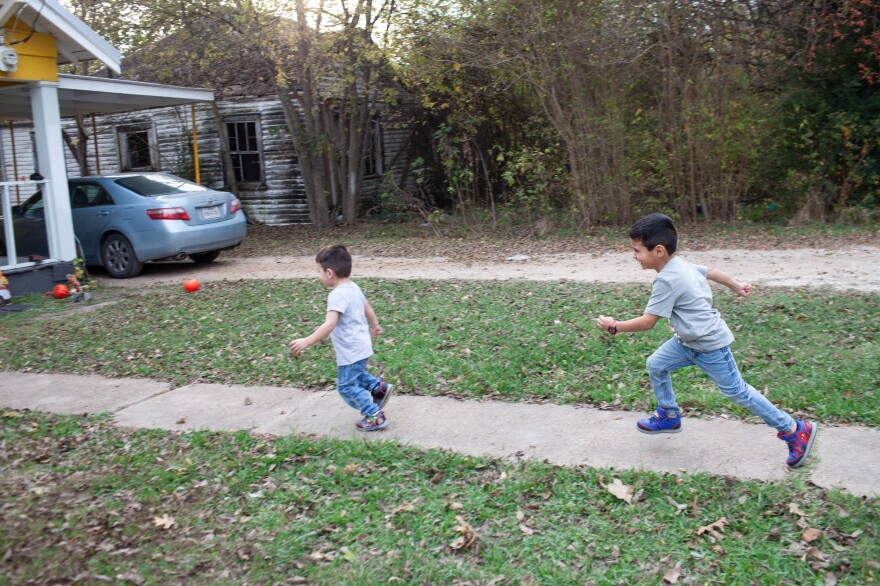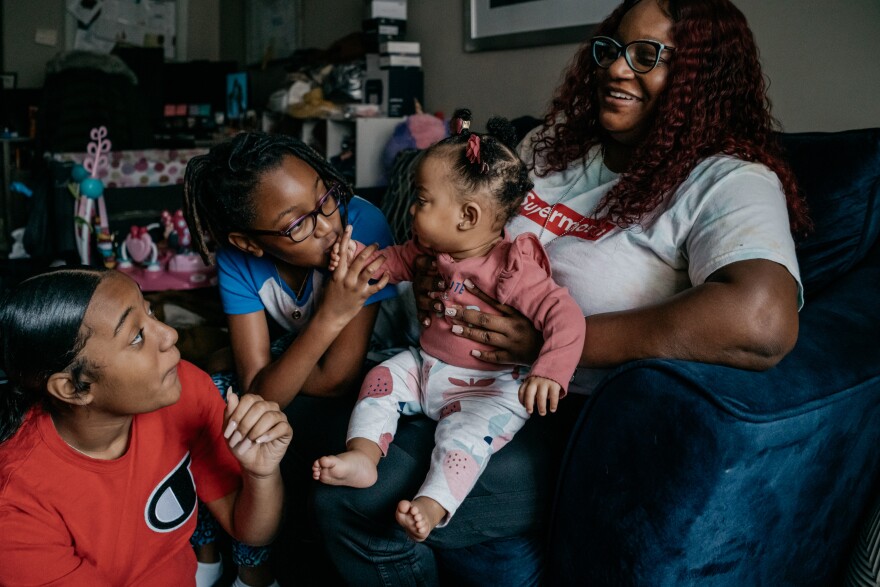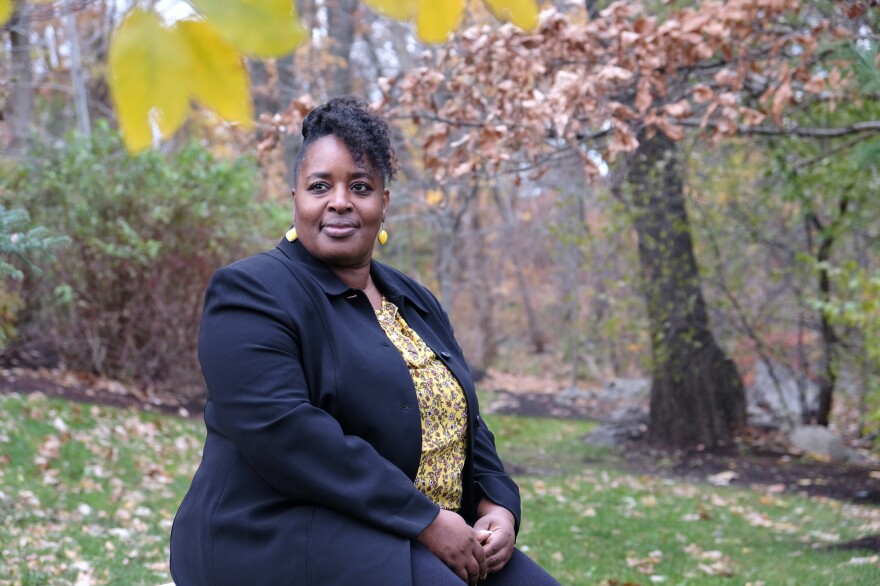There are more homeless families in the United States than in any other industrialized country. The main cause is the lack of affordable housing.
Nearly 172,000 families experienced homelessness in 2020, making up about 30% of the homeless population.
Many of those families comprise single women with young children who have no choice but to seek family homelessness services: emergency shelters, transitional housing or permanent housing placements.
Some women remain stuck in the system. Others overcome adversity and become advocates in their community. Every woman who has battled homelessness has a different story to tell. Each with their own unique experience.
These are some of their stories.
"Poverty hits us all differently ... it can hit us at any time and I think the pandemic has shown us that"

Meshell Whyte, a single mother of a son with disabilities, was five months pregnant with him when she traveled back to the United States in 2016 from Antigua after attending her father's funeral. She ended up losing her home. She spent more than a month couch surfing in family and friends' homes before seeking help.
"That process was very challenging, it started with DHCD, [Department of Housing & Community Development in Boston]" Whyte says. "I had to prove my pregnancy, I had to prove I was couch surfing, so it took about 10 days to actually get placed at a [shelter]."
The now 48-year-old got placed in Hastings House in Boston, Mass. She says it's the largest family homeless shelter of Economic Mobility Pathways (EMPath) — a nonprofit that focuses on helping people out of poverty. She spent the next three years living in their shelter programs before finding an apartment.
"I was so eager to get out of the shelter that I took the first opportunity that came for an apartment, which was a disaster," Whyte, who lives in Mattapan, Mass., says. "It was infected, there were drugs in and out of the building."
Six months later Whyte was relocated to another apartment that became her new home. But her challenge didn't stop there. Whyte is still unable to work because of her son's disabilities. She says very few nurses are confident enough to care for him and the ones who do, Whyte says she has to give them direction and guidance. She relies on financial assistance from the government to stay afloat.

"Going through not being housed and having a child who is not fully able ... it plays a lot on your psyche emotionally, physically and mentally," Whyte says.
Whyte tried to find child care for her son, Julian Whyte, now 5-years-old, in hopes of returning to work in 2017. He was turned down from day care centers because his disabilities were too complex. He is nonverbal and struggles with neurological, respiratory, and orthopedic conditions. He entered the Boston Public School system in 2019 but with his multiple disabilities, Whyte is still always on call.
While looking for a job, Whyte has dedicated her time to becoming a leader in her community.
"From being in a shelter, I became an advocate for families, I became an advocate for housing and I became an advocate for homelessness," Whyte says. "I don't know where I would be if I wasn't an advocate."
Whyte volunteers with the Voices Advocacy Council (VAC) at EMPath, a group that shares its life experiences with policy makers and advocates for legislation in the Massachusetts State House.

"The [council] means a lot to me because it made me so aware of how much power I have as a constituent, how much power I have to educate policy makers, to enlighten them on what is really happening in the community," Whyte says.
Whyte says she wants policy makers to understand how people are being affected by the laws they are creating or even those they are failing to create. She wants to be part of the change.
"A lot of people like to complain and they like to sit back and see what happens but nothing is going to happen when you sit back," Whyte says. "You have to get involved, you have to be a presence."
Whyte says therapy helped her get through battling homelessness and caring for her son alone. She believes it's important for people to seek out therapy and not to be ashamed to show they need help.
"I know the life of isolation, I know the life of being locked in and it's not a good thing if you don't have someone to connect with," Whyte says. "Make a connection with someone who sees you, everyone sees you, you just don't know who's looking."
She was taken away from her mom, raped and beaten as a child, and didn't want that life for her kids
Maryanne Lundy, a single mother of three, had to quit her job at a hospital when the pandemic started. The schools closed and her older children 13-14 started doing school online. Then, the daycares shut down and the 39-year-old ran out of options.
"I don't have the support or the resources to help me with my kids, and their education is very important to me," Lundy says. "At the time, I felt like I could get another job but I didn't want to lose out on them being able to get an education."
Lundy started falling behind on her rent and ended up getting an eviction notice. She says the landlord and the trustees office weren't understanding of her situation even though it was in the middle of the pandemic.
"They didn't want to hear nothing ... they were just like see you in court," Lundy, who's located in Indianapolis, says. "And you don't want to go home and tell your kids that you've got to move."

She ended up losing her home in Dec. 2020 and started staying with family and friends. She eventually found her way to the Horizon House, a homeless shelter in Indianapolis, that placed her in a hotel to avoid the spread of the coronavirus.
"It was so much better because I didn't have to deal with someone else's kid and their families," Lundy says. "My kids didn't even think we were homeless because we had our own room."
She spent three months living in homeless shelters until she found an apartment in March this year with the help of Family Promise, an organization focused on ending family homelessness. She also started attending the organization's counseling sessions for single mothers.

"Just being a single mother and knowing that you are not the only one going through what you are going through. And having someone that you can talk to has been a big help in my life," Lundy says.
Since her eviction, Lundy has dedicated her time to helping other families who are going through the eviction process. She says many landlords take advantage of families who aren't aware of all their rights. Lundy wants to help people whose experience are similar to hers.
"I do all this by myself and I believe that I deserve the utmost respect because I break my neck and bend over backwards to do everything I can," Lundy says.
Lundy is no stranger to facing adversity. Growing up in Indianapolis, her mother was a single mom of five daughters. Her mother started battling alcoholism and mental health issues. Eventually, Lundy and her sisters were placed into the foster care system.

"I got taken away from my mom when I was 12 and so I'm very overprotective over my kids," Lundy says. "Every day I make sure to do everything I can to keep from being in that same cycle."
Lundy recalls days her mother would not come home, so she had to take charge of her siblings. She was also raped, molested and beaten as a child. Lundy didn't want that life for her children.
"I know I'm not going to be a perfect mother, I know my kids are not going to be perfect, but I can give them a chance to live a normal life," Lundy says. "I don't want what happened to me to happen to them ... I want to give them a fighting chance."
"It took me so long to get this far. I was in an abusive relationship"

Romona Bravo, a single mother of six, moved in with her parents in 2017 to help tend her mother who was in hospice care. After her mom died later that year, Bravo's brother started looking to sell the property. Bravo was asked to move out April 2021.
At the time, she was still in school full-time, not working and had recently left an abusive romantic relationship.
"I was like a baby taking a dive into the real world and so I mean that was really hard to do," Bravo says. "But you don't need a man or that other person besides you, you can do it on your own."
Bravo says she had been separated since 2017 but kept going back to the relationship until she was able to press charges and leave in April this year. After more than 20 years, she decided to turn her life around.

"I have two daughters and I want them to know that they don't have to be stuck in that relationship because they have that other person, they can do it on their own," Bravo sys. "They were a lot of my motivation to do this."
The 34-year-old reached out to Family Promise, an organization focused on ending family homelessness. Bravo wasn't sure what to expect. She says it was scary to be around social workers and child protection services because it reminded her of a life she was trying to escape.
"I got out of [the relationship] when it came to a point where I thought he was going to try to kill me," Bravo, who's located in Marlin, Texas, says. "I started to realize I wasn't happy and I was invisible most of my life, so I wanted something more."

Bravo started to pursue an associate degree in criminal justice. And, she got a job as a caregiver to save money. It wasn't easy at first. The children were lagging behind in school. She was overwhelmed and was getting bad grades. But, she didn't give up.
"I actually gained really good financial stability with my job. I am able to pay rent, my bills and still have money left over, Bravo says. "I'm still in school too, doing online classes and I'm not too far from finishing my associates degree."
She was able to find a new house with her children at the end of May. She says it was very affordable, super nice, and had its own backyard. This year will be the first time getting a Christmas tree to celebrate the holidays with her family in her new home.

"I'm excited because we can actually put the Christmas tree up and not be criticized, you know it's my home," Bravo says. "[Also] putting up Christmas, the decorations and all the presents."
When Bravo finishes her degree, she hopes to pursue a job as a probation officer or criminal investigator. She also wants to become an advocate for people who have endured domestic violence situations. She wants to help others like people helped her.
"I think if it wasn't for Family Promise and if I wasn't able to come on my own with my children, I would still be stuck and I would not be able to do this," Bravo says. "This was the first time I was going to be out on my own [and] I didn't have the time to do it on my own with everything going on."
"I was in a domestic violence situation and I had to get me and my kids away from my ex-husband"

Cassie Washington fled from her marriage in 2015. She became a single mother of two daughters and was left without a home. Washington spent the next three years living in a homeless shelter.
"I decided to leave when it got to the point of no reconciliation, and the event that happened was really triggering and it was a life or death matter," Washington says. "I had to go into survival mode for my kids and if I stayed, I probably was not going to stay alive."
She stayed with her grandmother until she heard about Bridge Communities, a nonprofit aimed to transition homeless families to self-sufficiency. She reached out in the hopes of starting her life over. She was severely in debt, living paycheck to paycheck and had left everything behind.

"In the beginning it was embarrassing, but it was [also] really humbling," Washington says. "It was different because I was listening to strangers, but my mentors became my family and my kids became really comfortable around them."
Washington and her children started attending therapy sessions to work through their experience together. As much as she wanted to protect them from the truth, the children were aware of what was going on. And, she wanted to show them it was nothing about which they should be ashamed.
"They were still able to live a perfectly normal life," says Washington, who's located in Aurora, Illinois. "They didn't look at it as, 'We are going away to this place without seeing our family'... we were still able to be around our family."

Washington also wanted to make a change for herself. She started attending Robert Morris University in Aurora and Schaumburg, the school's satellite locations, in order to graduate in a shorter timeframe and to pursue a bachelor's degree in management. She was working full-time, going to classes three nights a week while still juggling being a single mother and keeping up with rent.

In Feb. 2018, Washington completed her degree and was able to walk across the stage in front of her family and friends.
"It was a really happy day, like it was beautiful. I remember that day like it was yesterday," Washington says. "Out of all the hundreds of people that were there, I heard my kids yelling for me and I saw them standing and that brought me so much joy."
It's been three years since Washington has been self-sufficient. She says she currently has a job in quality assurance testing. She has been in a healthy two-year relationship with her partner. And, also had another daughter who is 8 months old.
The now 35-year-old wants to share her story with other people. She says people should be aware of what the warning signs in abusive relationships and recognize them before one falls in the danger zone.
It's always a domino effect that will continue to get worse. Washington says it's important to seek professional help even though she knows it's not always that simple.
"It's easier said than done when people tell you that you should walk away and that you shouldn't be with this person," Washington says. "Like when you're in love and trying to see the better good it's hard to walk away, you have to do that at your own time."
Camila Beiner is an NPR intern on the National Desk. contributed to this story
Copyright 2023 NPR. To see more, visit https://www.npr.org.




